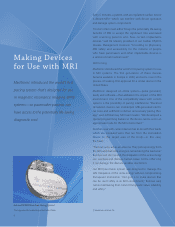Medtronic 2010 Annual Report Download - page 17
Download and view the complete annual report
Please find page 17 of the 2010 Medtronic annual report below. You can navigate through the pages in the report by either clicking on the pages listed below, or by using the keyword search tool below to find specific information within the annual report.
“Some current clinical trials are investigating intravenous
injection of therapeutic antibodies, with the goal of neutral-
izing and/or clearing the plaque-forming amyloid protein
suspected to be responsible for the majority of neurological
deterioration associated with Alzheimer’s disease,” she said.
“But with intravenous injection, the antibody molecules
may be too large to pass through the blood-brain barrier
effectively. That’s why there is a need for technology that
can safely deliver antibodies to the brain.”
Shafer and her team are using our drug-delivery technology
to slowly deliver plaque-fighting antibodies directly into the
brain. “In recent preclinical studies, we demonstrated that
delivering the antibodies directly to the brain required
significantly lower doses than systemic delivery, with better
efficacy and safety,” Shafer said.
While her team’s work has caught the attention of the
medical community—following results published in the
Proceedings of the National Academy of Sciences—Shafer
noted that the work is very preliminary. “While we are excited
about the results of our preclinical studies, we still have years
of research and testing to determine if we are able to
develop a therapy that can help treat Alzheimer’s disease
and other chronic neurological conditions.”
Lisa Shafer, Ph.D., is part of a team of Medtronic scientists working on delivering medications directly to the brain. They hope to understand the
potential for therapies that may be able to stop the neurodegeneration associated with debilitating diseases like Alzheimer’s.
13
























